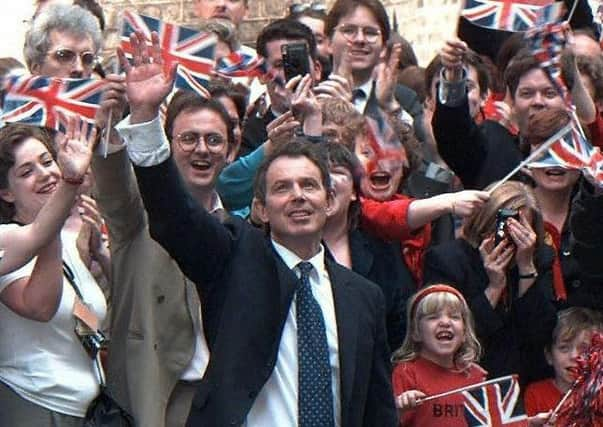Joyce McMillan: New voices needed in UK politics


The latest numbers from YouGov suggest that the Tories can expect to win 48 per cent of the vote, and are running 24 points ahead of Labour – a lead as large as the one Tony Blair enjoyed before his landslide New Labour victory in 1997. And although it’s difficult today to detect any kind of wild positive enthusiasm for the Conservatives, it’s clear that the party is not only benefiting hugely from the evident disarray in the main opposition party, but has also now – since its adoption of a “hard Brexit” stance – hoovered up large numbers of right-wing votes which, only a year ago, might have gone to Ukip.
If the outcome of the election seems all but inevitable, though, the apparent willingness of such large proportion of voters to support the Tories remains something of a mystery, given their record in government.
Advertisement
Hide AdAdvertisement
Hide AdSince 2010, the Tories’ ill-advised commitment to severe public spending austerity, in the depths of a recession, has inflicted huge damage on individuals and communities across the country, while depressing tax revenue and inflating the national debt. Investment and productivity have remained low, while household incomes declined by a shocking 9 per cent in the first years of the recession, and have not fully recovered.
And now, in the latest round of austerity, the Tories have begun to kick away the props – the in-work benefits and family credits – that made our insecure, low-wage economy tolerable for many families, yet still, the people do not protest. Nor do they turn against a government of millionaires who have systematically punished the working poor of this country, while ensuring that the seriously wealthy can walk away with their earning power, and their bonuses, absolutely intact.
So what, under these surreal circumstances, can the UK’s Labour Opposition possibly do, to transform the terms of debate? Back in 1997, of course, New Labour had an answer: they simply presented themselves as Conservatives-lite, less nasty than the Tories, more socially progressive, but just as aspirational, and just as friendly to the rich.
Since the economic crash of 2008, though, Labour’s lack of readiness to unite behind a real centre-left alternative to the present model of poorly-regulated and increasingly exploitative capitalism has proved fatal to its electoral prospects. With hindsight, it now seems obvious that during the Blair years, as trade union links weakened, the party simply lost its century-old culture of proud and purposeful working-class organisation for social justice, for systems that seriously resist exploitation, reduce poverty, and enhance social equality.
The result is that the language and experience of that shared struggle no longer has any place in the life of most British people and has been replaced by a language of strict individualism – of self-enrichment for the fortunate, and self-blame for the rest – that makes complaining about the privileges of the wealthy seem both impolite and pointless, and falsely frames the attempt to redistribute wealth through society as a recipe for economic failure.
In order to change this mind-set, in other words, the Labour Party would have not only to challenge the individualistic assumptions which most British people now bring to political debate, but also conjure up a credible alternative vision of exactly how a different society might look.
It was the presence of that kind of just-possible alternative vision – the “Nordic dream”, if you like – that unleashed so much energy around the Yes campaign in the 2014 Scottish independence referendum. There is nothing more powerful in politics than the idea that different worlds are possible, and may lie just within our reach.
For now, though, the dominant mood in British politics has nothing to do with hope, and everything to do with the kind of depressive cynicism which looks at today’s Conservative Party, recognises that they are – by any measure – a morally unattractive bunch, but believes, because we have so often been told it’s true, they are the ones who understand the rotten system we live in, and who know how to work it.
Advertisement
Hide AdAdvertisement
Hide AdOf course, this kind of cynicism eats the soul and corrodes well-being – we should live in societies that at least attempt to be decent and just, and are perhaps wise enough to tackle problems like climate change, so that we can believe in a real future for ourselves and our children.
At the moment, though, this murky and myopic vision of human nature – and all the ugly forms of hate and bigotry it tends to encourage – is the best the UK’s political system can manage; and it is absolutely clear that Jeremy Corbyn will not achieve the huge paradigm shift that is now needed simply by standing on the sidelines pointing out the indisputable truth that anyone who earns £70,000 a year or more is among the wealthiest 5 per cent in our society, and should probably be paying more tax.
To work, that shift would need a whole new generation of voices who sound like the centre-left leaders of the future; young people who simply refuse to live in the right-wing Brexit world conjured up by the Tories, and who demand something more intelligent, more just, more compassionate, and more forward-looking. The chance of those voices emerging at UK level any time in the next six weeks are of course close to zero.
But one day that shift will come, and history will not only dismiss Jeremy Corbyn as the wrong man in the wrong job at the worst possible time, but will write down the Tory governments of 2010-27 as among the most heartless, shallow and incompetent we have ever endured – the ones whose flawed ideology and narrowness of vision struck a body-blow against the hard-won peace of western Europe, and eventually brought the UK itself to the brink of disintegration.